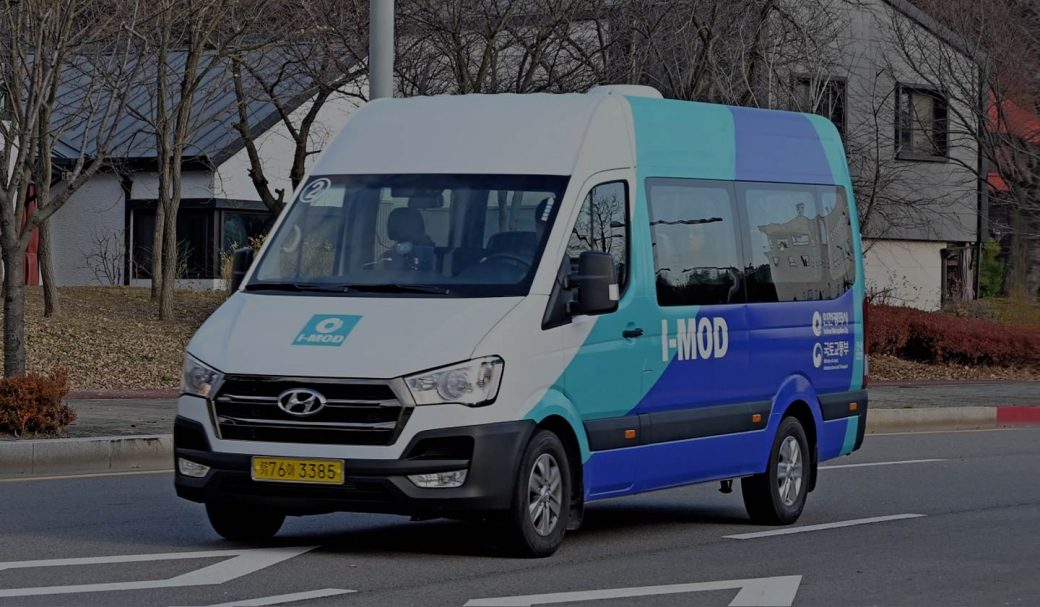Yeongjong International City is to launch a new type of public transportation. Incheon Mobility on Demand is, just as its name explains itself, operates in real-time demand.

Public transportations is a system of transport, in contrast to private transport, for passengers by group travel systems available for use by the general public. So it is supposed to serve the general public. But the citizens of Incheon did not think so, for having a lack of bus lines, too much wait time(78mins on average), and not enough buses. I-MoD service is selected and promoted by the City of Incheon with the consortium of Hyundai Motor Co., Ltd. to solve these problems.
*Hyundai Motor consortium Agencies: Hyundai Motor, Hyundai AutoEver, Seel, Yonsei University
This is how I-MoD works: If a person inputs the origin and destination on the app, a bus – after the user chooses one among the eight – will be deployed to a bus stop that is the nearest to the passenger using AI technologies. This service will enhance the efficiency of bus riding by reducing waiting and travel time based on its flexible operation.

Users pay on the bus using QR code downloaded on their smartphone app. This service will allow passengers on similar routes to share the bus, enhancing the efficiency of bus riding by reducing waiting and travel time based on its flexible operation.

I-MoD, an On-demand service, is an integrated multi-modal network. On-demand service is already in ubiquitous environments – now we use an app to have food delivered or call a taxi. We also get to watch any TV show or movies we want through an online video streaming app.

I-MoD is one of the projects of ‘Smart City Challenge’ organized by the Ministry of Land, Infrastructure, and Transport to solve problems confronting each city in Korea. Hyundai Motor consortium Agencies and the local government signed for MOU last June and articulated the service concept. Then the prototype I-MoD was available in Yeongjong International City from December 2019 to January 2020.

I-Mod only could happen because of the residents. Yonsei University was operating ‘Living Lab’, which is a group of residents trying to solve the problems facing their city by themselves. The seventy members of the Living Lab eagerly presented the public bus problems.
According to the Hyundai Auto Ever who developed the I-MoD platform, 6,410 users were signed up for the service and used the app for 532 times daily. The average wait time for public buses in Yeongjong International City was 78 minutes, but it decreased to 13 minutes, which is even shorter than the average wait time in Incheon(18 minutes) after the service was introduced.

I-MOD dramatically decreased waiting time thanks to the well-designed MOD platform. The MOD platform comprises every step required for I-MOD; and it integrates and analyzes data from the bus operation, intervals, bookings, payments, garage management, to the real-time data from user requests.
The data gathered is used for predicting the demand pattern. For example, if you could figure out which bus stop is the most used, I-MOD would be able to use the data to enhance waiting and traveled time. Real-time demand controls intervals to maximize efficiency.

Hyundai Motor plans to expand the service offering to other areas than Yongjong International City. To do so, Hyundai seeks to develop the service further – Voice recognition booking service for those who are not familiar with smartphone applications, Data blockchain management for Mobility-as-a-Service(MaaS) to collaborate with other types of a transportation system, and Auto-charging system using Bluetooth Beacon(a short-range radio transmitter).
The implementation of MaaS is also a key factor. The smart mobility platform that Hyundai Motor Group seeks to build is for ‘continuous mobility.’ The I-MOD user will be able to ride an electric scooter from home to the bus station, then use I-MOD to identify the fastest route to transfer to other public transportation. BlockChain and Bluetooth Beacon technology will be needed to utilize all data – from travel data to transaction history, for a more convenient mobile payment system.
It is also offering its electric scooter-sharing service, I-Zet, to provide a last-mile mobility solution, and ultimately, to bring MaaS in reality. For the trial period, its user is given 5,000 points after signing up. The points are for the later use, and they are given back when the scooter is back at its original parking spot.

Hyundai AutoEver plans to expand the MOD service area, especially where public transportation is not well-available. The MOD platform is now for governments, public institutions, and private companies. Currently, there are four directions: MOD for providing public transportation, MOD for the disabled or rural area, MOD for lowering traffic congestion, and MOD for tourist spots.

The role of MOD platform will become more important when data from traffic signals, construction zones, or car accidents are shared real-time basis. Everyone will move more freely and comfortably.
